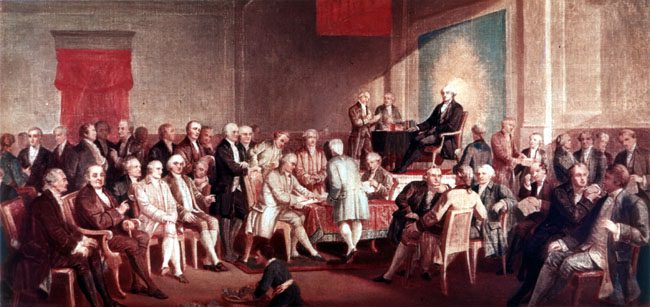Bill of Rights Day was December 15, the anniversary of that addition to our Constitution in 1791. Those ten amendments set forth our civil liberties. That is to say, it protects us from our own government, setting forth in the supreme law of the land what our government may not do to us.
An editorial in the Augusta (Georgia) Chronicle makes that point. And I appreciate how the editorial writer paraphrased each of the ten amendments in vivid, easy-to-understand language:
‒ Congress can’t pass any law about your religion; or keep you from practicing that religion. Congress can’t restrict what you say or publish. If you want the government to change something, citizens can gather peacefully and express their thoughts as a group.
‒ You can own and carry weapons.
‒ Soldiers can’t live in your house, unless Congress approves it during wartime.
‒ You, your house or your possessions can’t be searched unless a judge cites a specific probable cause.
‒ You can’t go on trial for a serious crime unless a jury says there’s enough evidence. If you’re found innocent, the government can’t retry you. You don’t have to say anything during your trial. You can’t be punished unless a jury convicts you. Unless the government compensates you fairly, it can’t take your possessions.
‒ If you’re arrested, either you get a quick public trial or they can’t unfairly detain you. A jury of your peers can help try you, and you get a careful explanation of what you’re accused of [and] who’s accusing you. And the government provides you a lawyer a lawyer.
‒ You have the right to a jury in a civil case, too.
‒ Excessive bail or fines, and cruel and unusual punishment, are prohibited.
‒ You have other rights, even if they’re not spelled out in the Constitution.
‒ Any power not specifically given to Congress rests with the states or the people.
How do you think we’re doing with these?
“You can’t be punished unless a jury convicts you.” No “excessive fines.” What about the fines and other punishments exacted not by a jury but by a federal agency for violating a federal regulation? “You don’t have to say anything during your trial.” But don’t prosecutors get around that by manipulative plea bargaining? Did General Flynn enjoy this protection? “Unless the government compensates you fairly, it can’t take your possessions.” How about the practice, which has become commonplace here in Oklahoma, of police confiscating vehicles and other property of people suspected (not convicted) of breaking drug laws?
Note that the second amendment–“You can own and carry weapons”–refers specifically to the right to “keep” arms (that is, to possess them) and to “bear” arms (that is, to carry them). Note that the full amendment, below, refers not to hunting but to a “militia,” the citizen’s military organizations that were alternatives in the early days of the republic to a standing army. But the weapons referred to are not being stored in an armory. Rather, citizens have the right to “keep” and “bear” them. And wouldn’t the militia context specifically allow for military weapons, at least the portable ones that a citizen could “keep” and “bear”?
What else do you see here, or in the text below, that needs bolstering today?
Here is the full text:
The Ten Original Amendments: The Bill of Rights. Passed by Congress September 25, 1789. Ratified December 15, 1791.
- Congress shall make no law respecting an establishment of religion, or prohibiting the free exercise thereof; or abridging the freedom of speech, or of the press; or the right of the people peaceably to assemble, and to petition the government for a redress of grievances.
- A well regulated Militia, being necessary to the security of a free State, the right of the people to keep and bear Arms, shall not be infringed.
- No Soldier shall, in time of peace be quartered in any house, without the consent of the Owner, nor in time of war, but in a manner to be prescribed by law.
- The right of the people to be secure in their persons, houses, papers, and effects, against unreasonable searches and seizures, shall not be violated, and no Warrants shall issue, but upon probable cause, supported by Oath or affirmation, and particularly describing the place to be searched, and the persons or things to be seized.
- No person shall be held to answer for a capital, or otherwise infamous crime, unless on a presentment or indictment of a Grand Jury, except in cases arising in the land or naval forces, or in the Militia, when in actual service in time of War or public danger; nor shall any person be subject for the same offence to be twice put in jeopardy of life or limb; nor shall be compelled in any criminal case to be a witness against himself, nor be deprived of life, liberty, or property, without due process of law; nor shall private property be taken for public use, without just compensation.
- In all criminal prosecutions, the accused shall enjoy the right to a speedy and public trial, by an impartial jury of the State and district wherein the crime shall have been committed, which district shall have been previously ascertained by law, and to be informed of the nature and cause of the accusation; to be confronted with the witnesses against him; to have compulsory process for obtaining witnesses in his favor, and to have the Assistance of Counsel for his defence.
- In Suits at common law, where the value in controversy shall exceed twenty dollars, the right of trial by jury shall be preserved, and no fact tried by a jury, shall be otherwise re-examined in any Court of the United States, than according to the rules of the common law.
- Excessive bail shall not be required, nor excessive fines imposed, nor cruel and unusual punishments inflicted.
- The enumeration in the Constitution, of certain rights, shall not be construed to deny or disparage others retained by the people.
- The powers not delegated to the United States by the Constitution, nor prohibited by it to the States, are reserved to the States respectively, or to the people.
Illustration: “Signing of the Constitution” by Thomas Prichard Rossiter [Public domain], via Wikipedia Commons














